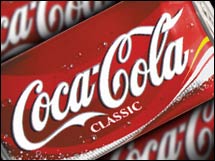2 sentenced in Coke trade secret caseEx-Coke workers sentenced to federal prison for plot to offer rival Pepsi sample of new product.ATLANTA (CNN) -- Two former Coca-Cola employees were sentenced Wednesday to serve federal prison terms for conspiring to steal and sell trade secrets to rival Pepsi. Joya Williams, 42, of Norcross, Ga., received an eight-year prison term, while Ibrahim Dimson, 31, got a five-year term, according to a news release from the U.S. attorney's office for the Northern District of Georgia. Both were ordered to pay $40,000 in restitution. Williams was convicted in February on charges that stem from a plot to offer samples of a new Coca-Cola (down $0.23 to $51.25, Charts, Fortune 500) product to Pepsi (up $0.36 to $34.17, Charts, Fortune 500) for $1.5 million. Dimson, who is from New York, pleaded guilty to a conspiracy charge in October. Edmund Duhaney, 43, of the Atlanta suburb of Decatur, will be sentenced at a later date, said the news release. The trio was arrested last July after a federal sting operation was launched when Pepsi tipped off Coke that it was being offered inside information. All three are charged with wire fraud and unlawfully stealing and selling trade secrets from Coca-Cola Co. "As the market becomes more global, the need to protect intellectual property becomes even more vital to protecting American companies and our economic growth," U.S. Attorney David E. Nahmias said of the case. "This case is an example of good corporate citizenship leading to a successful prosecution, and that unlawfully gaining a competitive advantage by stealing another's trade secrets can lead straight to federal prison." Dimson, using the alias "Dirk," sent a letter to Pepsi using an official Coca-Cola envelope last May. He later gave an FBI undercover agent 14 pages of Coca-Cola documents marked "Classified - Confidential" and "Classified - Highly Restricted," according to Nahmias. Coke officials confirmed the documents were tightly held trade secrets, he said. "Dirk" then requested $10,000 for the initial papers, accompanied by a letter promising to provide further documents on request, Nahmias said. "I can even provide actual products and packaging of certain products, that no eye has seen, outside of maybe five top execs," the letter states. "I need to know today, if I have a serious partner or not. If the good faith money is in my account by Monday, that will be an indication of your seriousness." "Dirk" provided other documents to the FBI for $5,000 and agreed to take $75,000 for a highly confidential product sample from a new Coca-Cola project. A surveillance camera placed in Williams' office videotaped her "going through multiple files looking for documents and stuffing them into bags," Nahmias said. "She also was observed holding a liquid container with a white label, which resembled the description of new Coca-Cola product sample before placing it into her personal bag. "Coca-Cola later verified the sample was genuine and is in fact a product being developed by the company," he said. On June 16, an FBI undercover agent met with Dimson at Atlanta's Hartsfield-Jackson International Airport. Dimson handed over a bag containing documents marked "highly confidential" and a glass bottle with a white label containing a liquid product sample, Nahmias said. The undercover agent paid Dimson $30,000 in $100 and $50 bills stuffed in a Girl Scout cookie box, he said. The agent also agreed to pay another $45,000 after successful testing of the product sample, he said. After the exchange, agents followed Dimson as he drove to co-defendant Duhaney's home in Decatur, Nahmias said. The three suspects were arrested July 4, the day they were supposed to be paid $1.5 million for the rest of the Coke secrets, he said. "Theft of valuable trade secrets will not be tolerated, not by the Justice Department and not even by competitors," Nahmias said in July. After the arrests, Coca-Cola Chairman and CEO Neville Isdell announced the company would review its security procedures. "While this breach of trust is difficult for all of us to accept, it underscores the responsibility we each have to be vigilant in protecting our trade secrets. Information is the lifeblood of the company," he said in a letter to employees. Isdell also thanked PepsiCo officials for alerting their competitor "to this attack." A Pepsi spokesman said the company was glad to help. "We did what any responsible company would do," the spokesman said. "Competition can be fierce, but it must also be fair and legal." |
Sponsors
|


